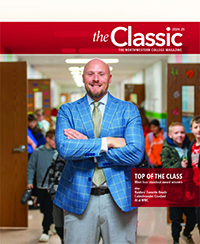Murphy announces plans to retire
Monday, October 9, 2006
“By announcing my retirement now and having a flexible departure date, I hope to enable the college to complete a search process without needing to appoint an interim president,” says Murphy. “Ideally, the new president will be able to be part of our 125th anniversary celebration during the 2007–08 school year and provide excellent leadership as we enter the public phase of fund raising for the $30 million Imagine Campaign.”
Upon retiring, Murphy plans to focus his energies on an initiative, “A new way of doing college,” which he has been pioneering for the last couple of years, drawing on his experience as a professor and administrator in higher education. The plan seeks to organize students’ college years in a more developmental way, integrating academics, student life and spiritual life, as well as an emphasis on reflection that leads to wisdom.
“We are grateful to President Murphy and his wife, Di, for their outstanding service and leadership to the college,” says Drew Vogel, chairman of the Board of Trustees. “Their enthusiastic, warm, welcoming leadership style has helped take Northwestern to the next level and cast a vision that will have an impact in the future.”
John Greller, vice president for advancement, says the Murphys have worked as a team to provide leadership for Northwestern.
“I believe among their greatest legacies will be their efforts to strengthen our sense of campus community, their work to enhance ethnic diversity on campus, and a continued emphasis on faith and learning,” he says. During Murphy’s presidency, Northwestern has set new enrollment records, growing by eight percent to 1,342 students; risen to a top-20 ranking among Midwestern comprehensive colleges by U.S. News & World Report; balanced the budget every year; and significantly enhanced the physical plant. Murphy has also hired and worked with a new generation of leadership at the cabinet level, which he cites as one of the highlights of his presidency. “I’m very pleased about the successful fund-raising campaign for the theatre building and the college’s glowing accreditation report, but watching the team of vice presidents grow and work well together has been one of the most satisfying things. In fact, seeing growth in people across our constituencies—from young faculty and staff maturing and taking leadership roles to board members becoming more involved to individual students finding their calling while at Northwestern—has been very gratifying. “One of the distinctives of Northwestern that we talk about is ‘a small campus with a large worldview,’” Murphy says. “I’m very pleased that distinctive has been lived out and enhanced. The sense of community on campus distinguishes us from other colleges, and yet more and more of our students are getting out into the world through study abroad programs and service opportunities. We’ve also had a good number of international students who have taken a place of leadership on campus.” Vogel, Northwestern’s board chairman, says the Executive Committee will be meeting soon to make decisions about the establishment and composition of a presidential search committee, as well as a timeline for the search process. Before taking the helm at Northwestern, Murphy served three years as provost at

